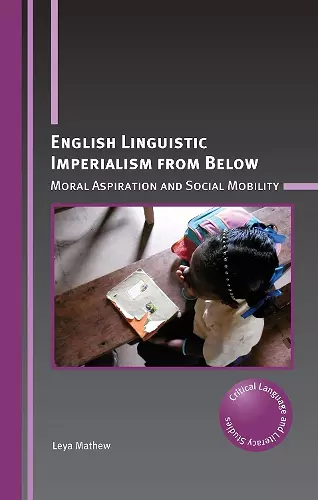English Linguistic Imperialism from Below
Moral Aspiration and Social Mobility
Format:Paperback
Publisher:Multilingual Matters
Published:11th Jul '22
Should be back in stock very soon
This paperback is available in another edition too:
- Hardback£114.95(9781788929141)

Provides fresh insights on questions related to the intersection of political economy and English language pedagogy
The book shows how English has been newly constituted as a dominant language in post-market reform India. Political economic transitions experienced as radical social mobility fuelled intense non-elite desire for English schooling. Rather than English schooling leading to social mobility, new experiences of mobility necessitated English schooling.
Imperialism may be over, but the political, economic and cultural subjugation of social life through English has only intensified. This book demonstrates how English has been newly constituted as a dominant language in post-market reform India through the fervent aspirations of non-elites and the zealous reforms of English Language Teaching experts. The most recent spread of English in India has been through low-fee private schools, which are perceived as dubious yet efficient. The book is an ethnography of mothering at one such low-fee private school and its neighboring state-funded school. It demonstrates that political economic transitions, experienced as radical social mobility, fuelled intense desire for English schooling. Rather than English schooling leading to social mobility, new experiences of mobility necessitated English schooling. At the same time, experts have responded to the unanticipated spread of English by transforming it from a second language to a first language, and earlier hierarchies have been produced anew as access to English democratized.
In this most sensitively written volume Leya Mathew lays bare the enmeshed environment in which English in India is caught. Anchored deep in the lives of those on the margins, the books uncovers the various contradictions that policies, human actions, pedagogies, and theories pose to any and all engagements around English; in steady and courageous tones, the book highlights all that we in our various applied linguistics worlds need to pay deep attention to.
* Vaidehi Ramanathan, University of California, Davis, USA *How is it that English linguistic imperialism is created anew amidst decolonizing educational reforms in the Global South? Taking us to Kerala, India, Mathew provides an eye-opening, disturbing and profoundly critical ethnographic look at this question from her perspective as researcher and practitioner. It is a poignant story of how non-elite mothers' bottom-up aspirations for their children to have English-medium education contradictorily founder in the child-friendly English language teaching pedagogical reforms of critical educators and well-intentioned policymakers. * Nancy H. Hornberger, Professor Emerita, University of Pennsylvania, USA *
As a reader who learned to speak in English at a young age, and, importantly, as someone who has never taught young English language learners, I was inspired by Mathew’s careful study of English language education in practice in homes and in classrooms and, particularly, the author’s analysis of how educators come to rely on rote pedagogies and the purposes these pedagogies might serve.
-- Swati Puri, Harvard University, USA, Harvard Educational Review Vol. 93 No. 2, 2023There remains a colonial tendency to relegate scholarship on/from India (as well as other ‘Global South’ locations) to ‘regional’ accounts of localized phenomena rather than holding the capacity to contribute a wider theoretical contribution (Pennycook and Makoni 2020). To this, Mathew’s book is a powerful rebuttal. At once deeply embedded in the local, and yet simultaneously applicable far beyond India’s borders, English Imperialism from Below is a crucial text for any reader interested in the nuanced and complex nature of language, aspiration, marginalization, and social mobility.
-- Katy Highet, University of the West of Scotland, UK, Applied Linguistics, 2023[This book] encourages educators to reflect on the complexities of linguistic imperialism and its implications for language teaching practices. Unlike conventional perspectives that emphasize the economic and political advantages of language acquisition, Mathew’s emphasis on the agency of non-elites redirects attention to often neglected gender-related challenges in education and social consequences. Equally important, Mathew demands context-specific analysis in understanding the global spread of English.
* Lily Thukral, Shirayuri University, Japan, GALE 2024 Vol.ISBN: 9781788929134
Dimensions: 234mm x 156mm x 11mm
Weight: 260g
208 pages